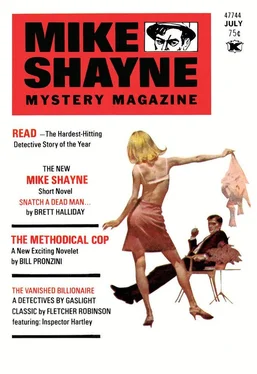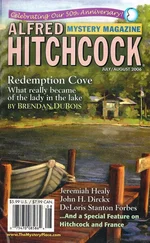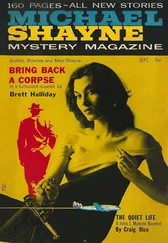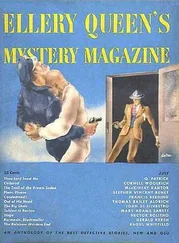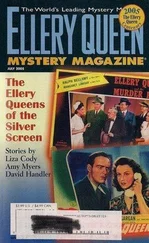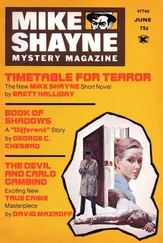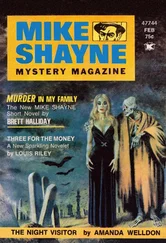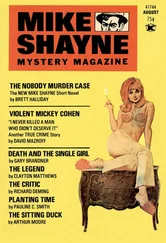Бретт Холлидей - Mike Shayne Mystery Magazine, Vol. 33, No. 2, July 1973
Здесь есть возможность читать онлайн «Бретт Холлидей - Mike Shayne Mystery Magazine, Vol. 33, No. 2, July 1973» весь текст электронной книги совершенно бесплатно (целиком полную версию без сокращений). В некоторых случаях можно слушать аудио, скачать через торрент в формате fb2 и присутствует краткое содержание. Город: Los Angeles, Год выпуска: 1973, Издательство: Renown Publications, Жанр: Детектив, на английском языке. Описание произведения, (предисловие) а так же отзывы посетителей доступны на портале библиотеки ЛибКат.
- Название:Mike Shayne Mystery Magazine, Vol. 33, No. 2, July 1973
- Автор:
- Издательство:Renown Publications
- Жанр:
- Год:1973
- Город:Los Angeles
- ISBN:нет данных
- Рейтинг книги:4 / 5. Голосов: 1
-
Избранное:Добавить в избранное
- Отзывы:
-
Ваша оценка:
- 80
- 1
- 2
- 3
- 4
- 5
Mike Shayne Mystery Magazine, Vol. 33, No. 2, July 1973: краткое содержание, описание и аннотация
Предлагаем к чтению аннотацию, описание, краткое содержание или предисловие (зависит от того, что написал сам автор книги «Mike Shayne Mystery Magazine, Vol. 33, No. 2, July 1973»). Если вы не нашли необходимую информацию о книге — напишите в комментариях, мы постараемся отыскать её.
Mike Shayne Mystery Magazine, Vol. 33, No. 2, July 1973 — читать онлайн бесплатно полную книгу (весь текст) целиком
Ниже представлен текст книги, разбитый по страницам. Система сохранения места последней прочитанной страницы, позволяет с удобством читать онлайн бесплатно книгу «Mike Shayne Mystery Magazine, Vol. 33, No. 2, July 1973», без необходимости каждый раз заново искать на чём Вы остановились. Поставьте закладку, и сможете в любой момент перейти на страницу, на которой закончили чтение.
Интервал:
Закладка:
Di Lucca realized Corcoran was no longer at his side, and pivoted away from the bookshelves. The rookie was on his hands and knees on the fireplace hearth, between a small stack of cordwood and an antique set of fire tools, peering up the chimney.
Wearily, Di Lucca crossed the room and asked, “What are you doing?”
“Looking up the chimney,” Corcoran answered.
“Well, I can see that.”
“Nothing up there but soot.”
“What did you expect to be up there?”
“I don’t know, I was checking. It’s too narrow for a man to squeeze through, too.”
Di Lucca was somewhat incredulous. “Did you think the murderer came down the chimney, shot the old man, and then went back up it again?”
“I was only trying to be thorough,” Corcoran said defensively. “This is a locked-room mystery, and the answer has to be in here somewhere. I wonder—”
Di Lucca didn’t want to know what he was wondering, and he was saved from immediately finding out by the sound of voices out in the corridor. There was a knock on the door. Di Lucca said, “What is it?” and the uniformed cop put his head through and announced that the lab crew had arrived. A moment later half a dozen men trooped in, carrying cameras and lab kits, and, in the case of the assistant medical examiner, a battered black doctor’s bag.
Di Lucca conferred with the man in charge of the lab crew, Joe Dillon, and told him what kind of thing they apparently had; Dillon said that if there was something to be found in the library, they would find it. Then Di Lucca went out to the corridor and told the uniformed cop to get his partner and to search the grounds on the chance that the murder weapon had somehow been gotten out of the house.
The patrolman nodded and hurried away, and Di Lucca turned and saw that Corcoran was fiddling with the double entrance doors. He had pulled them nearly shut from inside the library, and was examining the bar-lock arrangement.
“Rennie,” he said suddenly, “I think I found something.”
He opened one of the doors and Di Lucca went in and said, “What is it?”
“Well, look at this door lock. It seems to have been kind of loose — I mean, even before Prentiss broke the doors open. Here, I’ll show you what I mean; I’ll go out in the corridor and you close the doors and hold the bar-lock in place.”
He went into the hallway, and Di Lucca shut the doors and held the bar-lock across them. Corcoran pressed against the doors from without, and even with the pressure Di Lucca was applying, the two halves parted slightly. The rookie’s left eye was visible in the small vertical opening.
“You see, Rennie?” he asked.
Di Lucca opened the doors again. “See what?”
“What could have happened. The murderer could have pressed against the doors just like I did, until they parted that half inch or so. Then he could have wedged a gun into the crack, peered along the sight, and shot old man Warren there in the library: you can see the body from the door; it’s on a direct line. Murder in a locked room!”
Di Lucca said patiently, “Why?”
“Why? Why what?”
“Why would the murderer want to kill Warren that way? Why would the old man be locked in the library at six-thirty in the morning in the first place? Why would the killer be skulking about in the corridor with a gun? And why aren’t there any gouges or scrapes in the wood edges of the doors, which there would be if a gun was wedged between them?”
“Oh,” Corcoran said.
“Come on,” Di Lucca told him, “it’s time we went and had a talk with the two nephews and Miss Becky Hughes.”
They left the library and started down the corridor. Corcoran said meditatively, “One two, buckle my shoe; three-four, shut the door.”
Di Lucca looked at him. “What was that?”
“The old nursery rhyme. You know: five-six, pick up sticks.”
“Nursery rhymes,” Di Lucca said.
“Well, I’m trying to concentrate on that angle now. ‘Pick up sticks’ has got to mean something, doesn’t it?”
“If Prentiss was telling the truth, it does.”
They reached the door to the parlor, and entered — and Di Lucca felt as if he had stepped more than a hundred years into the past. It was furnished in a combination of styles: ranging from New Gothic to Biedermeier, circa 1850, with paneled oak walls and furniture in a variety of polished woods.
There was a buffet that was mahogany veneer on pine, covered by a tapestried black cloth; a walnut sofa upholstered in blue brocade, with matching chairs; oak end tables. White cotton curtains were on the windows, and the carpeting was blue chenille. In one wall was a fireplace that had a beige marble mantelpiece and a tinted mirror above it, and an embroidered birch firescreen in front of it. A crystal chandelier hung from the ceiling.
Corcoran took it all in a little disbelievingly, and Miss Hughes, who was sitting on one end of the sofa, said, “It kind of throws you at first, doesn’t it? Simon — Mr. Warren — loved antiques, and every room in the house is, you know, a different period.”
Di Lucca was looking at the two men who sat on the matching walnut chairs. One of them was dark-haired and handsome, dressed in a suede jacket and doeskin slacks; the hair was wavy and fashionably long, as were his sideburns and his Continental-style mustache. The other man had sandy hair, pale blue eyes, a petulant mouth, and agitated hands; he wore a polo shirt and brown slacks.
Both of them stood up and the dark-haired one said, “I’m Everett Finney. You’d be Lieutenant Di Lucca, right?”
“Sergeant Di Lucca.”
“Oh, sorry. This is my cousin, George Charon.”
“How do you do,” Charon said.
Di Lucca introduced Corcoran. Finney asked. “Have you found out anything yet about Uncle Simon’s death?”
“We’re still investigating,” Di Lucca told him noncommittally. “Have you and your cousin and Miss Hughes been here together since the shooting?”
“More or less,” Finney answered. “We went to our respective rooms to dress while Prentiss was calling you people, and then met here a few minutes later.”
“Did any of you leave the house for any reason?”
Finney and Charon shook their heads, and Miss Hughes said, “Well, I went out to meet those nice uniformed officers when they got here, but nowhere else.”
“All right,” Di Lucca said. “Now what I’d like to do is ask each of you some questions — individually, if you don’t mind. Is there some place private that’s close at hand?”
Prentiss, who was standing regimentally by the curtained windows, wearing an expression of hostility directed at the other members of the household, indicated a closed door at the far side of the parlor. “In there is a small sitting room, sir.”
“Thanks.” With Corcoran at his heels, Di Lucca crossed to the door and opened it; the sitting room, being more or less a part of the parlor, was furnished similarly if less luxuriantly. He pivoted in the doorway and said, “Miss Hughes?”
She sighed and stood up and went into the sitting room. Di Lucca shut the door and invited her to sit down on the blue brocade loveseat along one wall.
“Now then, Miss Hughes,” Di Lucca began, “suppose we start with your whereabouts at the time of the shooting.”
“I was in bed.”
“On the second floor?”
“Yes, my room is next door to Simon’s — Mr. Warren’s — down at the end.”
“You heard the shots?”
“I sure did. It sounded like cannons going off.”
“What did you do?”
“Well, I didn’t know what it was. I was still half asleep. Then I heard Prentiss running downstairs, and pretty soon some banging sounds, and I put on my negligee thing and ran down there. Prentiss and George and Everett were all there in the library, with poor Simon on the floor, dead and everything. I almost fainted when I saw the blood.”
Читать дальшеИнтервал:
Закладка:
Похожие книги на «Mike Shayne Mystery Magazine, Vol. 33, No. 2, July 1973»
Представляем Вашему вниманию похожие книги на «Mike Shayne Mystery Magazine, Vol. 33, No. 2, July 1973» списком для выбора. Мы отобрали схожую по названию и смыслу литературу в надежде предоставить читателям больше вариантов отыскать новые, интересные, ещё непрочитанные произведения.
Обсуждение, отзывы о книге «Mike Shayne Mystery Magazine, Vol. 33, No. 2, July 1973» и просто собственные мнения читателей. Оставьте ваши комментарии, напишите, что Вы думаете о произведении, его смысле или главных героях. Укажите что конкретно понравилось, а что нет, и почему Вы так считаете.
